- Home
- Bruce Sterling
Globalhead Page 14
Globalhead Read online
Page 14
Impressed by his rhetoric, the two veterans exchanged quick glances.
“His Majesty has replied to me. He has praised the Mountain-Leaping Pioneers. He has decreed that the soldiers who avenged his honor should be rewarded.” For the first time, the General looked at them directly. “That means you, boys. You’re to be given Names.”
“Names!” Halli blurted. They flung themselves to the carpet.
The General called out. Light flooded the tent as an orderly looked in. “Tell His Eminence I’ve found the heroes,” the General said. “Ask him to join us here.” He turned to the camp-slut, lowering his voice. “Go on in back, girl.” The General’s girl rolled her kohl-smeared eyes, then wearily shouldered her fan and vanished through a beaded curtain.
The General gestured brusquely. “Get up, boys, you’re in the way there. Go over there by the censer. You may sit.”
The two men crawled rapidly across the carpet into a corner of the tent, then sat cross-legged, grinning at each other.
“Now listen,” said the General into mid-air, not bothering to look their way. “The King’s inspector, His Eminence the Baru of Shamash at Nineveh, arrived here in camp last night. He came in secrecy to take omens of our success, bless the camp, and examine the state of our souls.” The General frowned. “He has brought you your Names from the capital. I know that you two fine soldiers are going to make a dignified, pious impression on His Eminence. Understood?”
They quailed under his glare. “Yes, Lord General.”
The General turned away. Halli and Bel-Heshti traded anxious looks. Early in the war, the King’s inspectors had arrived in long chariot trains, with outriders and standards flying, and plenty of warning. Now all that had changed. Now the Baru of Shamash at Nineveh, a man with the ear of the King himself, had appeared in the very midst of camp before anyone could even get himself into a state of grace. Bel-Heshti and Halli would have to appear with their imps and sins hanging all over them, with their hearts all thickly greased with misbehavior.
The Mountain-Leapers’ chaplain, Father Sennanurgal, crept into the tent, looking itchy and flustered. He held the flap back, bowing, as the Baru’s retinue appeared.
First a temple-scribe stepped in, blinking, followed by a reader of bird-flights. Two cult mediums stalked after them: trance-mystics wearing heavy, dust-stained cloaks with thick woolen cowls. Huge masks of snarling bronze encased their sweating heads. The two masked men took their places at each side of the entrance.
The Baru of Shamash entered last, with dignified tread. He was a tall, gaunt prelate in a deliberately plain brown robe. He clutched a short staff of office: a mace of twisted antelope horn, topped with a gold knob depicting an adder’s fanged head.
He wore a tall brimless hat of layered black wool. Two small, discreet bull’s horns peeked from their turbanned wrappings. Silver chains threaded his lean, corded neck, holding a dozen flat square charms of chiselled alabaster.
The General, his hand to his heart, knelt briefly and rose. “Your Eminence.”
The Baru gazed about him, sniffing at the dusty air. “We can speak in confidence here? The Elamites have spies in your camp, General.”
The General tugged at his beard. “Well, of course, Your Eminence. Can’t fight a war without spies. We have several agents inside the city. Better spies than theirs …”
The Baru stepped stiffly toward Bel-Heshti and Halli. “Who is this, lurking in the shadows?”
“Ah,” the General broke in, “those are your heroes, Eminence. The head-takers. Pioneers Halli and, er, Bel-Heppi.”
Halli and Bel-Heshti grovelled with their best grace. “Bless us, Lord Eminence!”
The Baru, mollified, raised one hand and sketched a protective sign above their heads. Then he gave Bel-Heshti a short prod with the end of his crooked staff. “Sit up, son, let me look upon your face.”
Bel-Heshti sat up, trembling. The Baru stared lingeringly into his eyes. “So,” he said at last. “Now you.” Halli sat up and received the same treatment.
“You boys have been drinking.”
“Oh, no,” Halli squawked.
“Really,” Bel-Heshti added.
There was a long silence. “We only coveted drink, Your Holiness,” Halli confessed at last, unable to bear the strain.
“We … we plotted to drink,” Bel-Heshti moaned. “We know we’re sinners, Your Eminence! We’re not worthy.”
The Baru nodded, satisfied. “You can tell me all about it later, at confession. Yes. You must be purified and in a state of grace when I present you with your Names before the troops.” He turned aside. “You do have a bath here, General?”
“Why, yes, Eminence.”
“And a woman to pour it for you, no doubt.”
“Well, I, er, that is—” the General began, but Bel-Heshti alertly broke in.
“A bath!” he cried rapturously. “Thank you, Your Eminence!”
The Baru stared at him skeptically.
“Do you know what it means to be given a Name?” he said at last. “Do you truly understand that, in your heart?”
“We know we don’t deserve it,” Halli mumbled.
“In the beginning,” the Baru said with bone-chilling solemnity, “nothing had a name, and chaos alone existed.” He gestured briefly, and one of the masked mystics began to chant in a high, muffled, metallic voice.
“When the heavens above were yet unnamed/ And no dwelling beneath was called by a name/ When no names had been yet recorded/ And none of the gods had been named/ When there were no signs and sigils/ When the language of omen was mute …” The Baru gestured again, and the paralyzing drone broke off. Halli shivered violently.
“Without names, nothing can be,” the Baru said. “To this day, you have not existed. The gods have had no name for you. You have been common men, mere walkers upon earth, almost as beasts. Like shadows, your passing left no trace, for you were not recorded. But now you shall be Named Men, thanks to our King’s grace and his regard for your loyalty.”
The Baru paused. “You shall be cleansed and shriven of sin and dressed in fine raiment. Your Names will be presented to you before the troops so that all may see how King Ashurbanipal, son of Esarhaddon, rewards those who serve the gods. Now think well on what I have told you. I shall speak to you again at confession.”
He beckoned to the scribe, who crawled rapidly forward. The Baru handed him a small leather bag, then turned away. “General, a word with you.” The Baru and the General stepped across the tent and began to mutter together.
The scribe was a middle-aged city man with thinning hair and watering, myopic eyes. He murmured a quick invocation in the holy language of Sumer and slipped the bag’s drawstring. He shook the bag, and two small cylinders of alabaster tumbled out, each the size of a finger’s joint. They lay in the palm of his hand.
He held them before the two soldiers. Halli, overcome, wiped away tears. Bel-Heshti smiled shakily.
“Your Names,” the scribe said. “With these, you men can become true citizens. You can own property and mark it with your Name. You can own slaves, who will carry your name-seal around their necks. You can sign documents, and borrow on the strength of your Name. You will be Named Gentlemen. You will exist.”
The scribe opened the flap of his wicker shoulder-bag and pulled out a small, flattened brick of damp clay. He took one of the seal cylinders and rolled it expertly across the clay, using two fingertips.
He held the damp brick before their eyes. The cylinder’s intricately carved surface had pressed out a little embedded scene: a four-winged god raising his arms in blessing before two rearing, winged antelopes. A column of tiny cuneiform glyphs stood in the left corner. The scribe read it for them: “He who smote the enemies of the gods, in whom the King is pleased, the hero Halli.” Halli caught his breath in wonder.
The scribe turned the tablet over and ran the second seal across the other side. It showed a sacred palm tree and Ishtar in her aspect as war goddess, carrying a bow
and standing on a small crushed lioness. “It is the same inscription, but for the hero Bel-Heppi,” the scribe said.
“Not Bel-Heshti?”
The scribe frowned. “I suppose it could read Bel-Heshti, with the syllabic interpretation … That’s a rather difficult character.” He wiped the seals carefully with an oiled scrap of wool.
Bel-Heshti grinned widely. “It’s the most wonderful thing I’ve ever seen! May I hold it?”
“Certainly not!” The scribe shook his head, and reverently slipped the seals back into their bag. He leaned forward confidentially. “Gentlemen-to-be, I must tell you that, magically speaking, this is a most dangerous time. Your Names have been chiselled and blessed, but have not yet been bestowed upon you. The identity of Name and Soul is not yet established; you are neither Named nor nameless. At such time the demonry are most active. They swarm about you, things of chaos, longing to seize your Names, your spiritual reality, for themselves!”
Bel-Heshti and Halli, frightened, made luck signs. “What shall we do then, learned sir?”
The scribe glanced over his shoulder and lowered his voice. “I would beg permission of the Baru and the General to retire to your tent and pass the time in prayer until the ceremony.”
“Good idea! We hear and obey,” said Bel-Heshti. They crept on hands and knees across the carpet toward the Baru and the General. There they waited, with heads low, for a chance to make their presence known.
The General ignored them. “But, Eminence! He’s nothing but a heretic. The men don’t pay any mind to his ravings.”
The Baru glowered. “What! You mean to tell me that limb of Hell has been spewing his poison over your army, day after day? Lamashtu’s Name, General! It’s a wonder plague hasn’t broken out.”
The General smoothed his beard. “Well … we do have Father Sennanurgal to protect us …”
The Baru shook his head in wonder at such laxity. “There should have been a ranking baru or at least a properly trained ashipu here at all times.” The scribe knelt at the Baru’s elbow and offered him the leather bag with the two Names. The Baru nodded, blessed the bag, and slipped it back into his robe. Then he beckoned to the reader of bird flights. The reader stepped forward, his head bowed.
“You have been reading the animal omens, brother?”
The reader nodded grimly. “Indeed I have, Your Eminence. Plague among the horses.”
“So! You see?” said the Baru to the General, loudly. “You’re spiritually outmatched here; that’s the problem. No wonder this siege has dragged on so. You should be halfway to Susa by now. But this Elamite, this thorn in the side of righteousness, has been spurting his venom over your troops. Dragging at their wills. Filling the camp with imps that turn your luck against you!”
Father Sennanurgal cast himself wailing at the Baru’s feet. “Forgive me, Eminence! The fault is mine!” He tore at his hair and beard. “I’m only a humble army chaplain! I should have known I was outmatched!”
The Baru regarded him sternly, then smiled. “No, good Father Sennanurgal. If not for your stout, if humble, protection, things would have been far worse!” He turned to the General. “Yes, there has been damage done; but that is past.”
Turning toward the tent’s entrance, the Baru raised his voice to a boom. “Call forth your men, General! The day’s worst heat is over; battle looms! No more shall your troops suffer under this wretch’s imprecations! I shall go forth and do spiritual battle with him and crush him utterly!”
The Baru gestured to his two masked aides. They turned and threw open the tent flaps with practiced, dramatic gestures. A dozen orderlies and runners stood outside, curious.
The Baru took a deep breath and stepped into the glare. “The city falls tonight!” he bellowed, with absolute and terrifying conviction. “Ashur commands it! Their old men shall give up their heads, their young men’s severed limbs shall be cast into fire! The women shall be taken away, the granaries thrown open to our soldiery! The skins of their priesthood shall cover the battlements; the holy places shall be sacked, and their mysteries exposed to the sun! The fields shall be sown with salt, for the rage of Ashur falls heavily upon this place …” A crowd of excited soldiery gathered rapidly around him. He turned toward the city wall, raising one clawlike hand in malediction.
The General stared after him, open-mouthed. He reached down and helped the portly Father Sennanurgal to his feet.
“He’s great, eh?” Sennanurgal confided, trampling Halli’s hand as he found his balance. “There’s a new breed of priest in Nineveh these days! No half-measures!”
“These ears hear you!” said the General, grinning ferociously. He stepped toward the tent flaps.
“Lord General!” Bel-Heshti cried from the carpet. “My comrade and I beg leave to retire to our tent and pray for guidance!”
The General stopped in mid-stride. “What? And miss this? Call yourselves soldiers? Come on, heroes! Follow me!”
They jumped up and hurried from the tent, at the General’s heels. At his shouted commands, heralds blew their trumpets, and bearers seized the army’s standard.
The masked mystics had produced brass cymbals from beneath their cloaks. They pounded them noisily as the crowd surged toward the city’s walls, following the Baru of Shamash.
Carried away by excitement, the Babylonians whirred their slings overhead, the loud drone whipping up spirit.
Bel-Heshti and Halli jostled for a place as the General’s elite bodyguard quickly gathered around the standard. The Baru, contemptuous of safety, ignored the trenches and marched on level ground almost to the foot of the wall. Two engineers with curved wicker shields rushed forward to shelter him, but he waved them back. Behind him, Assyrian archers, still strapping on helmets and stringing their bows, filed into the trenches. Sappers, holding shields above their heads, ran forward to the shelter of the covered battering-rams.
The Baru raised both arms. “Come forth, scorpion!”
The Elamite prophet had fallen silent as the army swarmed forward. Now he also waved his shield-bearer aside and gazed down over the battlements, leaning on his straightened arms. “What jackass brays?”
“Unworthy man,” said the Baru simply. His scorn echoed with majestic depth. “You think with your curses to save your town from those whom the gods command. I have seen many such as you. But you have never seen my like before. I am the Baru of Shamash at Nineveh, Mother of Cities!” A gasp came from the Assyrian ranks, followed by a ragged cheer. They had not known he was a priest of such high name. They could feel that their luck was turning. Their morale soared.
Halli and Bel-Heshti felt it where they stood: a surge of spirit as the army began to realize, to believe, that this might at last be the end. They could sense the enemy’s fear, the stirring of panic behind the walls. The General felt it too, and turned to his aides. “Ready the ladders; be quick.”
The Elamite prophet raised his voice. “So! A baru, a high official of the court! At last, someone here to negotiate! To put an end to this madness!”
The Baru was pitiless. “It will indeed end soon. When your king’s head hangs from a tree in the gardens of Nineveh.”
“But King Teuman wants peace! Again and again we’ve said it! Why such mad hatred? It was only a border skirmish!” The heretic prophet seemed suddenly frantic. “Ashurbanipal is mad! Demons of hatred possess him! He bathes in blood!”
“Your blood,” the Baru pointed out. Harsh laughter rose from the Assyrians. They smelled terror. Their ranks stirred restlessly, almost tasting the future joy of rushing through the city, looting, burning, maiming, raping.
For a moment the enemy priest vanished from the parapet. Loud catcalls rose from the Assyrians as they milled in growing fury. The Elamite reappeared. “Creep back to Nineveh and your temple boys!” he shouted over the sudden din of bloodthirsty jeers and shield-beating. “Back to your mad king in his den!”
“I will go to Nineveh,” the Baru bellowed calmly, “when I have your tongue to tak
e with me!” Here and there the army’s brighter soldiers yelled approval at his wit. “Your day is over, heretic! There was one like you at Nabu-Shumati, city of Elam. And that city fell!” A loud cheer from the Assyrians. “And another at Shushinak, city of Elam, and it fell.” A louder cheer. “Dar-Teuman, fort city of your coward king, has fallen!” Frenzied yells of triumph from the Assyrians, for this was news. Buoyed by their howls, the Baru seemed struck with inspiration. “All this despite the lying tongues of heretics! You shall be mute, priest! Shamash has promised me your tongue!” The Baru pulled a drawstring bag from within his robe and shook it above his head. “I have six such tongues already, within this leather bag!”
The army roared approval. “The lying dog!” Halli gasped, elbowing Bel-Heshti. “He’s got our Names in there!”
The Elamite prophet screamed, his words lost in the Assyrians’ din.
Suddenly ten Elamite defenders rose from where they had crouched in hiding, on the catwalk behind the battlements. They flung down long, snaking siege-ropes, their ends weighted with barbed grappling hooks. The hooks hissed down around the Baru. Most missed, but one knocked the tall hat from his head, and two more snagged his robe. The Baru twisted and dropped his staff, crying out.
“Shoot!” the General shouted. Arrows sleeted upward. The Elamites fell back, some pierced and howling, others hauling their ropes back for another cast. The two defenders who had caught the Baru struggled to haul him in. He was lifted squirming from the earth, a hook snagged in his belt. He dropped the bag of Names.
The General watched coolly. “Ladders forward!” he shouted. The army’s shouts broke into a maelstrom of rage.
The Baru’s robes ripped. He fell out of them, landing heavily, his ribs scraped and bleeding. His mystics rushed forward, dragging him to safety. They left the bag of Names where it had fallen.
Bel-Heshti and Halli watched in occult horror. Then, as one man, they burst from the midst of the General’s guards. Then ran headlong to join the howling Babylonians, who dashed forward, vaulting their ladders against the city wall.

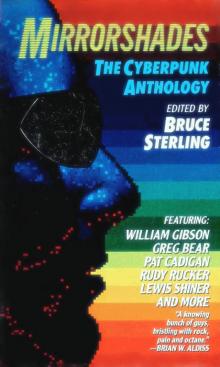 Mirrorshades: The Cyberpunk Anthology
Mirrorshades: The Cyberpunk Anthology The Wonderful Power of Storytelling
The Wonderful Power of Storytelling Love Is Strange (A Paranormal Romance)
Love Is Strange (A Paranormal Romance) Globalhead
Globalhead Essays. FSF Columns
Essays. FSF Columns The Hacker Crackdown
The Hacker Crackdown Bicycle Repairman
Bicycle Repairman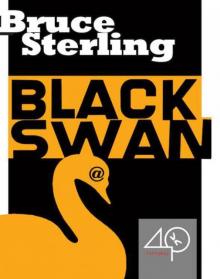 Black Swan
Black Swan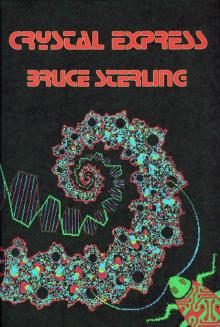 Crystal Express
Crystal Express Islands in the Net
Islands in the Net Pirate Utopia
Pirate Utopia GURPS' LABOUR LOST
GURPS' LABOUR LOST The Dead Media Notebook
The Dead Media Notebook Unstable Networks
Unstable Networks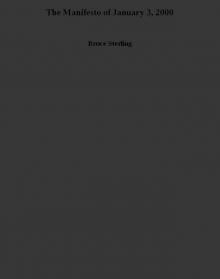 The Manifesto of January 3, 2000
The Manifesto of January 3, 2000 Heavy Weather
Heavy Weather Involution Ocean
Involution Ocean The Epic Struggle of the Internet of Things
The Epic Struggle of the Internet of Things A Good Old-Fashioned Future
A Good Old-Fashioned Future The Littlest Jackal
The Littlest Jackal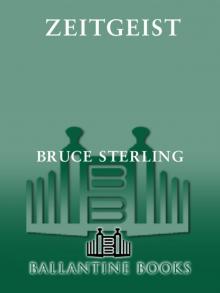 Zeitgeist
Zeitgeist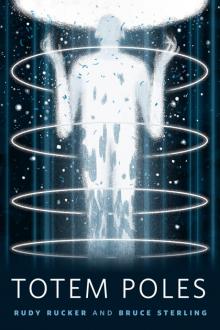 Totem Poles
Totem Poles Ascendancies
Ascendancies CyberView 1991
CyberView 1991 War Is Virtual Hell
War Is Virtual Hell Taklamakan
Taklamakan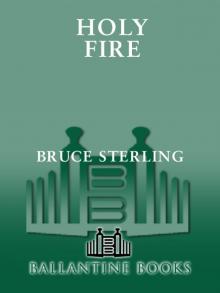 Holy Fire
Holy Fire Cyberpunk in the Nineties
Cyberpunk in the Nineties Schismatrix Plus
Schismatrix Plus The Artificial Kid
The Artificial Kid Essays. Catscan Columns
Essays. Catscan Columns Maneki Neko
Maneki Neko Distraction
Distraction In Paradise
In Paradise Red Star, Winter Orbit
Red Star, Winter Orbit Luciferase
Luciferase